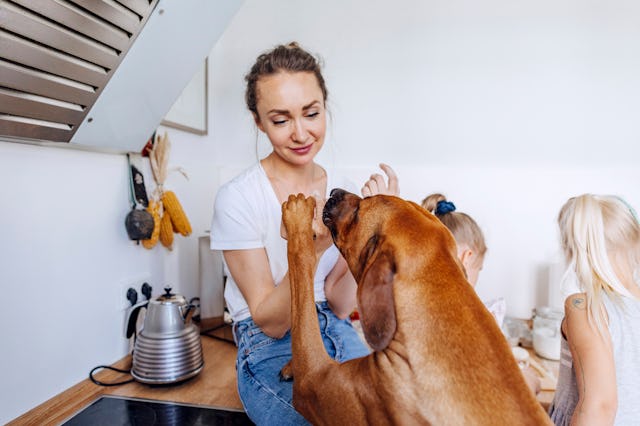Why Is My Dog So Clingy? I Asked A Veterinarian How Much Neediness Is Normal
Raise your hand if you’re all touched out 🙋🏻♀️

Confession: I've spent quite a bit of time lately thinking about how our very lovable dog is, quite frankly, driving me up the wall. He's the one hounding me out of bed before my newborn, who just fell back asleep. The one nudging my hand on my mouse during client phone calls. The one poking me in the side, the leg, the body all day long so that I'll pet him again. So, at the risk of sounding like a real a-hole here, I'll tell you the problem. My dog… loves me too much. And it's becoming a deal.
Before you decide I'm just the worst pet owner on the planet, let me fill you in on just how well-loved, exercised, and cared-for this dog is. He runs and walks daily with our family. He has kids everywhere throwing the ball for him, playing tug of war, and showering him with attention. He's healthy, well-fed, and generally a happy guy.
Only, no amount of petting, hugging, cuddling, and attention will *ever* be enough. Sounds like a great problem to have, right? It is, except that I'm already struggling with feeling "touched out" by my breastfeeding babies and five total kids. There is absolutely no physical space in my house where someone isn't quite literally hanging off my body or nudging me to provide something — in my dog's case, constant affection.
But who wants to "train" their dog to be less affectionate? It seems counterintuitive, and even sort of mean. So, I asked veterinarian Grant Little from JustAnswer about this little guilt-inducing conundrum of mine.
Where's this coming from?
The first step, Little explained, is to figure out why my dog is so clingy to me in particular. It honestly reminds me of "imprinting" for the ol' Twilight fans out there — he's decided it's me and me alone he must love. If I pet him, it begets hours more of begging to be petted. His tank has no "fill line." He's like the kid who wants four more Oreos if I give them one. Research backs the idea that dogs value praise even more than food, but this level of affection? I wasn't ready for it.
"You have to first see what your pet's reaction is in the home to certain people. Is the dog more clingy to one of the owners in the house and hides from another? Does the cat always hiss when one of the people walks in the room?" he says. "These are some early indications that they have a particular person that they prefer or people that they prefer to not be around. While some of this can be natural for pets, it can be destructive in ways around the house."
Like most curious dog behaviors, it's always good to get the pet checked out to ensure their behavior isn't stemming from a deeper medical issue. Luckily, after doing this, my overly affectionate pup came back with a clean bill of health. But for others, Little explains that you might see bigger issues stemming from over-affection that calls for more intervention than just an extra pet, including:
- Separation anxiety that leads to destructive behaviors
- Stress-induced diarrhea and lack of appetite
- Stress-induced vomiting
- Inappropriate urinating on objects
- Hypersalivation and panting
For cats, the symptoms can be similar. However, Little adds they are much more prone to something called idiopathic feline cystitis, a type of behavioral stress-induced urinary issue that leads to bleeding in the urinary tract with pain.
So, what can you do?
Of course, there's no real "fix" for my healthy but overly loving dog, and it's not a trait I'd want to train out of him, as ridiculously annoying as it can be. Sure, it'd be more convenient if my 65-pound dog didn't try to climb into my lap while I was pumping on a Zoom call, but here we are.
Little shared a few tricks I plan to try, including "enrichment" activities in the house in case my dog is bored. It's time to:
- Shop for those dog treat puzzles (finally!)
- Go on more walks
- Invest in behavioral training
- Consider anti-anxiety medication for my pup
"These changes can help prevent these behavioral issues from causing further damage to the animal, the home, or the human/animal bond between the owner and pet," he explains.
But in the meantime, I'm having to examine my own bandwidth, recharge when I can, and figure out how to set boundaries — basically all the most fun momming tasks, just the dog-mom version. Although, let's be honest, I'll just give in to his puppy dog eyes until I lose it again and hide in the shower from all the people and pets who need me.
This article was originally published on